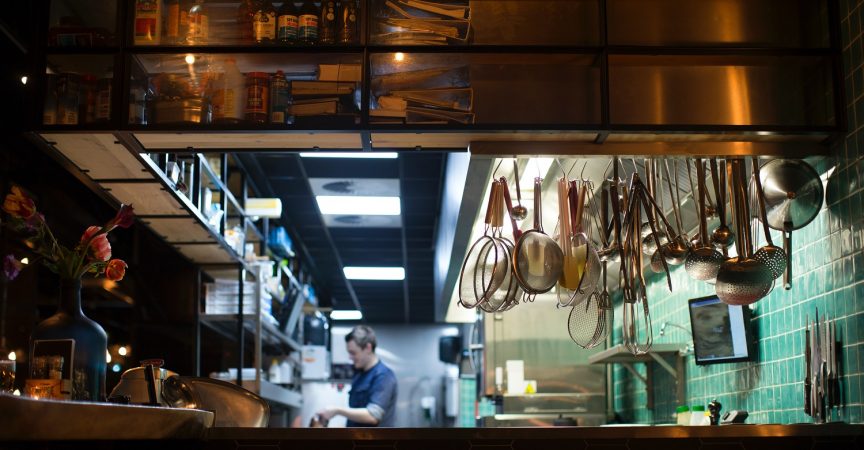Marketing for Change
Initiatives within the foodservice industry create social and economic opportunities for Canadians. Finding a way to give back can be a huge undertaking or a small shift in the way your company does business. It can come in the form of a shipping container, or a pop-up, or an auction paddle. Whatever such movements look like, they help stir others into action and bring communities together.
BUILDING ROOTS
A brightly-painted storage container on Toronto’s Queen Street East announces the Moss Park Market, the heart of the Building Roots program. Building Roots was founded by Lisa Kates and Darcy Higgins in 2013 around the perceived scarcity of fresh food in a city where green space is disappearing. Higgins has a background with food advocacy group Food Forward, and Kates got her start in catering—making soup out of Toronto’s Depanneur kitchen space—and working with at-risk youth. When the Moss Park neighbourhood saw its main supermarket close, Kates and Higgins recognized an opportunity.
“The residents had concerns about how they were going to access fresh, affordable food,” says Kates. “Moss Park is overlooked. There is nothing happening there, and we thought we could help. It was our idea to have a shipping container as a grocery store right in Moss Park. It is the first ever shipping-container grocery store in Canada.”
Funding was the first challenge. Building Roots received a generous donation from The Daniels Corporation; an insulated, heated and powered storage container from Storstac; and land from Toronto Community Housing. The market is open three days a week in the winter and four days a week in warmer weather. Offseason, distributors deliver the fresh produce and dry goods. In season, fresh fruits, vegetables and herbs come from much nearer by.
“We have a farm in Ashbridge Estate,” says Kates. “Just two kilometers away. Ontario Heritage approached us a couple of years ago and said they wanted this wonderful green space to be animated.”
The gardens were planned and planted by the Toronto Black Farmers and Growers Collective, holistic nutritionist Heather Allen and Johl Whiteduck Ringuette of Nish Dish.
“The footprint is very small,” says Kates. “A lot of the time, someone will go harvest the food, and bike it along Queen Street.”
The reaction in Moss Park has been tremendous. “They love the market,” says Kates. “And it’s growing. We now also have a cooking program. Chef Teneile Warren comes once a month to make lunch or dinner for the residents using food from the market. It takes a lot to get something like this off the ground. We’ve done it, and it’s ongoing, and hopefully everlasting. We have confidence that we could go into another community and be consultants. I feel very privileged actually that we’re allowed to do what we do.”
Kates encourages everyone to shop at the Moss Park Market—including Toronto restaurants. “We have to be connected, so we know what’s going on in the city,” she says. “We want everyone to shop there to support the vision. If there are chefs in the neighbourhood, come, buy food from us. Let’s work out an arrangement. You would be buying food that’s truly local, and helping out a really wonderful initiative. We need people to believe in what we’re doing. It’s a big vision, but it’s one we’re really proud of, and one the residents are proud of.”
buildingroots.ca
THE AUCTION HOUSE
Proving that charitable initiatives can be woven into the everyday business of a restaurant is the Auction House in Halifax. The brewpub, which specializes in Nova Scotian craft beers, occupies an old auction house, as its name suggests, built in 1765. The pub opened three years ago, and since its beginnings has made giving back to the community a part of the way it operates.
General Manager Stephen MacDonald explains: “Every table has a paddle, so when somebody does an auction, you have that paddle at your table for bidding. We do some daily auctions and special events auctions. The proceeds all go to charities.” Items for auction include meals, gift cards, sporting event tickets, hotel stays, art, company swag from local breweries and more.
The most popular lot? “People love the brunch for two item,” says MacDonald. “Those are probably the most popular.”
This year, the Auction House is focusing on local charities, including Chisholm Services for Children and the Halifax Cat Rescue Society. The whole Auction House staff is on board, with the team deciding what charities to feature. The pub also offers event space to charitable organizations for free, and such organizations are encouraged to use the auction model themselves for fundraising. For some events, the Auction House will donate a portion of profits from food and drink sales.
The pub encourages other businesses in Halifax and the surrounding area to get involved by donating items for auction.
auctionhousehalifax.com
NEWCOMER KITCHEN
Launched in 2016, Newcomer Kitchen brings Syrian refugee women into the kitchen at the Depanneur, a small venue for culinary pop-ups in downtown Toronto. Each week, six to eight women cook traditional Middle Eastern fare for sale in “the Dep” and online. Len Senater is the force behind the program. He started the Dep seven years ago as a way to showcase culinary talent and do pop-up events.
“I was interested in the phenomenon of pop-up dining, but I thought that there was a lack of creativity because the financial barrier to entry was so high,” says Senater. “I had this idea that if I created a small venue that had everything you needed to host a pop-up, you could invite a much greater diversity of people to cook, and the events would be more affordable, and you could bring a much more diverse group of people to eat.”
Newcomer Kitchen evolved, quite simply, from an act of welcoming.
“I had this idea that if I created a small venue that had everything you needed to host a pop-up, you could invite a much greater diversity of people to cook, and the events would be more affordable, and you could bring a much more diverse group of people to eat.”
“When I first heard of the Syrian refugee families, many of them were stuck in hotels for weeks or months at a time, where they had no kitchens at all,” says Senater. “It wasn’t much of a stretch for me, as a small gesture of hospitality, to extend an invitation to come use our kitchen.”
Senater says they pretty much sell out every week. The profits go directly to the cooks.
“When we started, the women were still in hotels being processed,” says Senater. “We found a way to make them feel welcome and participate, to be part of a positive narrative about their country. We were able to give them a sense of optimism about what this new place might hold for them.”
Now the Dep is receiving calls from around the world from venues that want to launch something similar. Says Senater: “I think the potential of the idea is bigger than just the tiny Depanneur, so we incorporated the Newcomer Kitchen as a nonprofit organization. Navigating the world of nonprofits has proved more difficult than running the program itself.”
As to how others can get involved in this and similar ventures, Senater says the Dep is always looking for industry partners and collaborators. “We want to work closely with the people who do know how to make a go of this,” he says. “There’s so much kitchen space that’s dark for some portion of the week. There’s a capacity that this project can tap into to bring these spaces to life, not only bringing attention to the host, but also support to these communities. I wanted to help. I asked myself what I could do with what I have. Well, I have a kitchen…”
Photo Credits: Canadian Free Press







